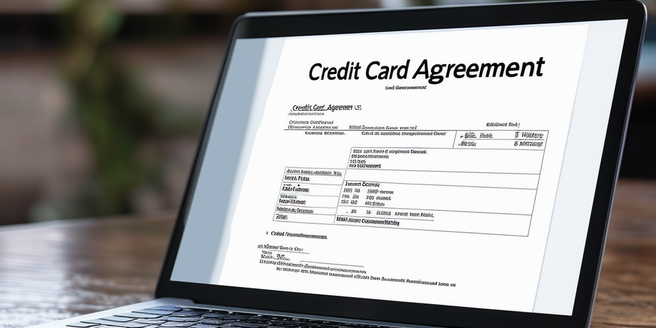
Identifying the Key Elements of Your Credit Card Agreement
A credit card agreement is a legally binding document that lays out the terms and conditions for using the card. Furthermore, it stipulates the actions that the credit card company can take in case of default or other breaches of the rules. It defines your responsibilities and rights as a cardholder, including your credit limit, the interest rates charged, any fees applicable, and the procedures for making payments. Understanding these elements is critical as it helps you to use your credit card wisely, avoid heavy penalties, and keep your credit score in good shape.
Understanding Interest Rates and Fees
Credit card agreements specify the annual percentage rate (APR) which influences the amount of interest you pay for balances carried beyond the billing period. This rate is distinctive to each credit card and can vary based on the type of transaction. Therefore, it is crucial to understand the intricacies of your APR and how it impacts your overall credit costs. Fees such as cash advance fee, balance transfer fee, late payment fee among others could also be charged. Assessing these charges helps you to judge whether the credit card aligns with your financial habits and needs.
Making Sense of Your Card’s Grace Period
The grace period in credit card usage is a specific time between the conclusion of your billing cycle and your payment’s due date. This critical interval lets you maximize your credit card’s benefits as new purchases won’t accumulate interest if your previous balance was entirely settled. Thus, making the full use of this grace period can lead to significant savings from unnecessary interest and better management of your credit card expenditures.
A deep understanding and the shrewd use of the grace period permits strategic spending and optimizes your credit capacity. It helps maintain a healthy credit score and avert needless interest charges. Being aware of this grace period also aids in planning your finances, preventing distressing credit card debt. It’s primarily a vital tool for balancing credit card spending and sustaining financial stability.
The Hidden Traps of Balance Transfer
A credit card balance transfer can be an effective way to save money on high-interest debt. This method works by taking advantage of the lower interest rates offered by some credit cards. It essentially allows you to move your debt from one card to another with lower interest rates. However, there may be a balance transfer fee. Also, the promotional low or zero interest rate often lasts for a limited time. Upon expiry, the remaining balance is subject to a higher ongoing interest rate. Knowing these traps will ensure a smart use of the balance transfer facility.
What Happens If You Miss a Payment
Missing a payment on your financial obligations carries severe repercussions such as, late fees, increased interest rates, invalidated promotional offers, and serious negative impacts on your credit score. A late fee may be levied on your account if your payment arrives after its due date, significantly increasing your outstanding balance. Increased interest rates on your current outstanding amounts could accelerate your debt growth making it harder to pay off in the long run. Any promotional offers you’re currently benefiting from could be invalidated by a single missed payment, leading to the loss of valuable benefits. Consistently missing payments can harm your credit score affecting your future borrowing potential and creditworthiness in the eyes of lenders. It’s crucial to understand these implications and set up reminders or configure auto-payments to avoid missed payments for smooth and worry-free financial management.
How Your Credit Card Agreement Affects Your Credit Score
Your credit card agreement, which mandates the ways your lender reports your credit activities to credit bureaus, plays a vital role in your financial health. Understanding these terms can provide insight into how every transaction, payment, and outstanding balance can impact your credit score. Two impactful factors on your credit score are timely payments and keeping your credit balance low compared to your overall credit limit, also known as your credit utilization rate. These reflect financial responsibility and wise credit management, boosting your credit score. However, consistently late payments and high credit utilization rates can decrease your score by portraying reliance on credit. Understanding these stipulations enables one to use credit to their advantage and maintain a high credit score.
